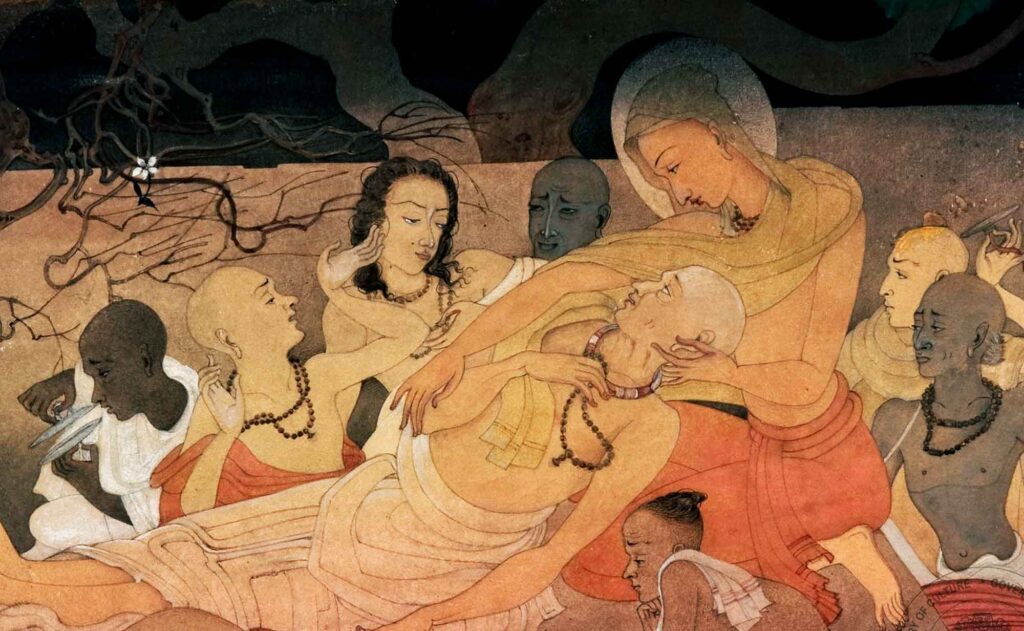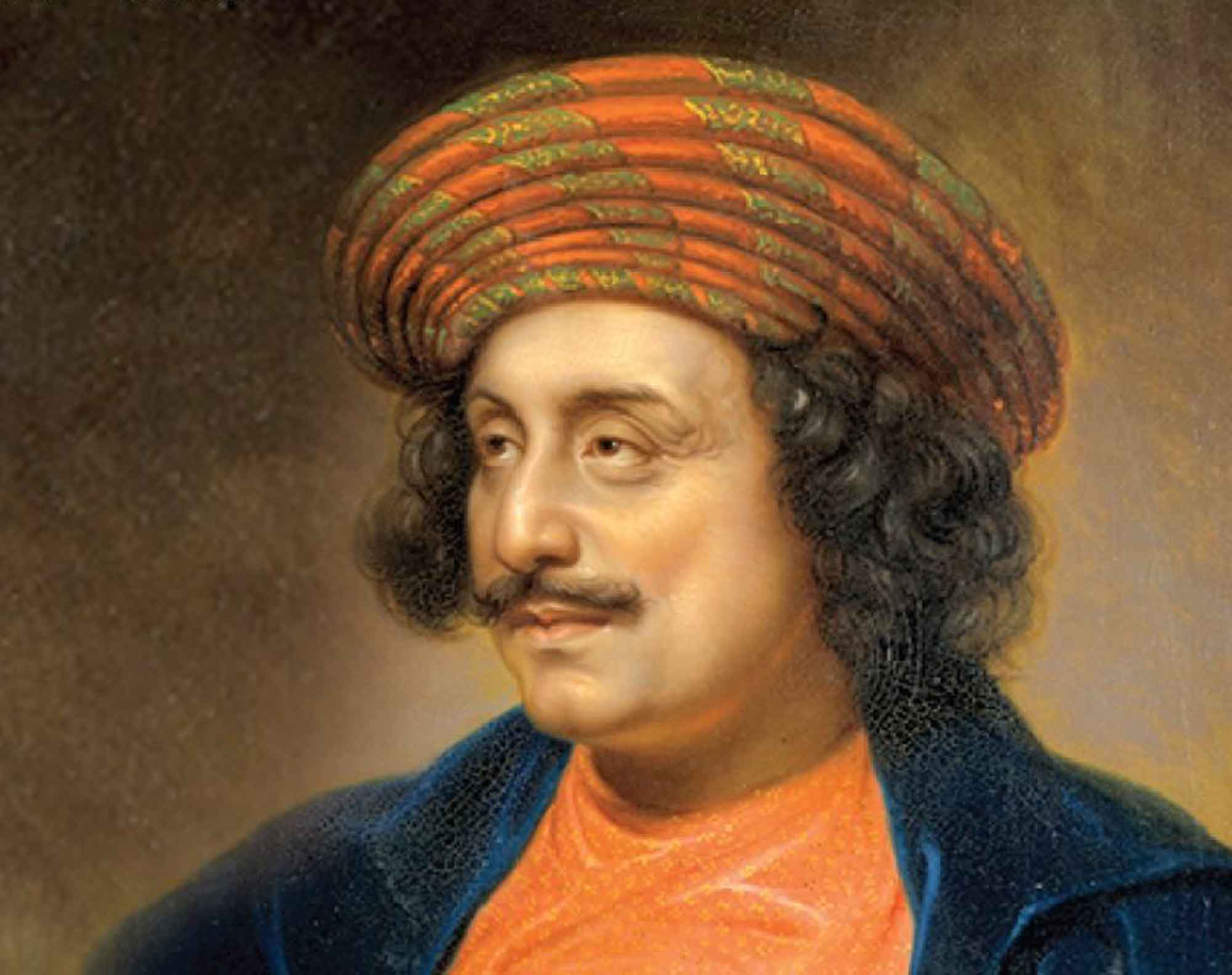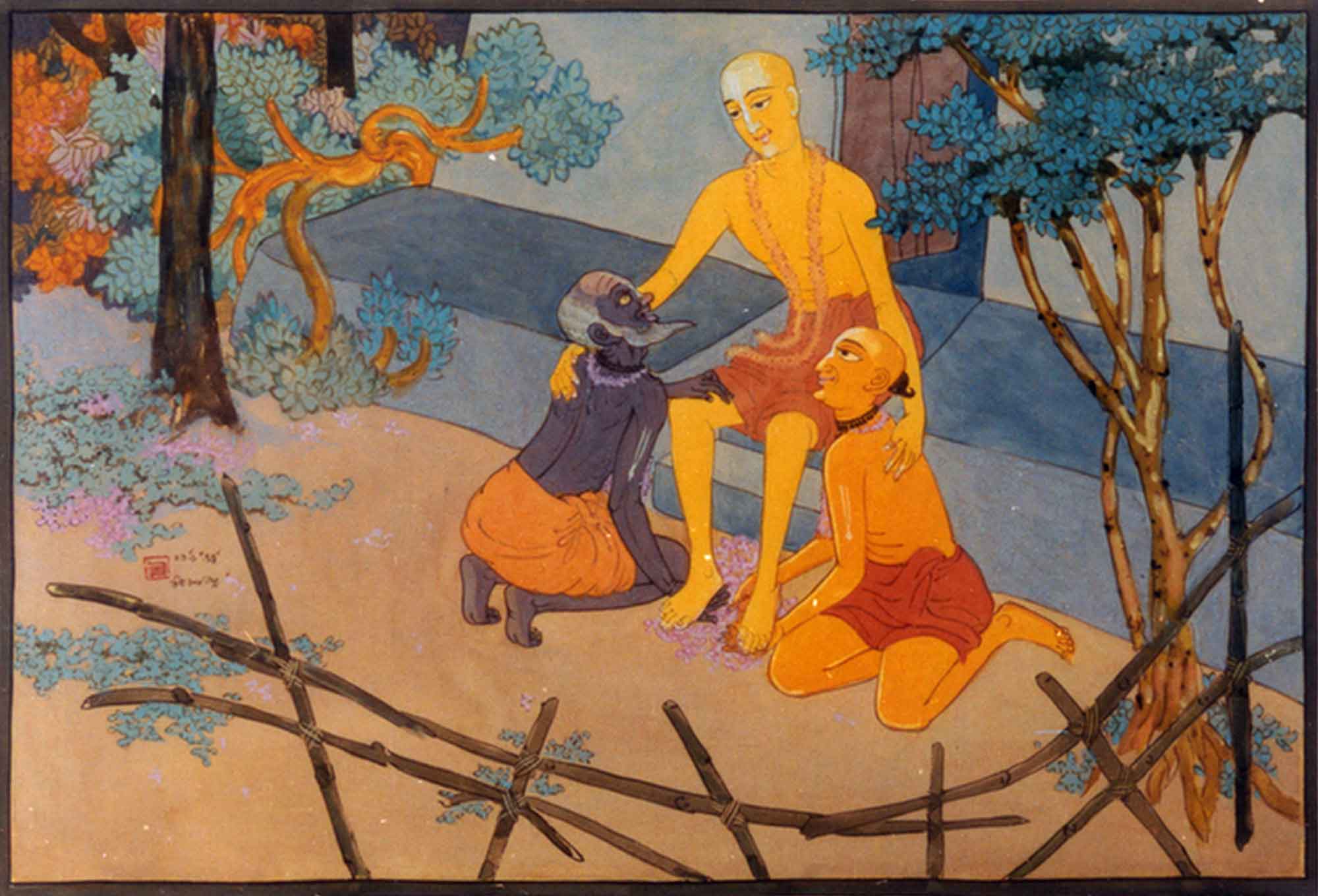Overview
Viśuddha Bhajana (Pure Bhajana) was first published in Sajjana Toṣaṇī Vol.11 issue 7 in 1899. This article by Bhaktivinoda Ṭhākura is a concise and important explanation of what is necessary to improve one’s bhajana in order to achieve prema.
(translated by Swami B.V. Giri)
paḍile śunile kabhu kṛṣṇa prāpti naya
bhajile viśuddha bhāve tabe kṛṣṇa pāya
(“One can never attain Kṛṣṇa by erudition. Only if one performs pure bhajana can one attain Kṛṣṇa.”)
This advice is found in the writings of any devotee mahājana. This advice is the confidential basis of truth. Many perform bhajana-sādhana with a lot of effort, but even with so much endeavour, no benefit arises. It seems that the only reason is that it is not pure bhajana. In regards to kṛṣṇa-bhajana, one must completely give up all impure thoughts and deeds – only then can it be called pure bhajana. Thus, it is necessary for all those that desire to perform bhajana to consider and abandon those impure thoughts and actions. If one does bhajana purely, then pure bhakti is gained. And the result of pure bhakti is attaining the feet of Bhagavān. Apart from this, there is no other way of attaining Him. In the Śrīmad Bhāgavata, Bhagavān says:
bhaktyāham ekayā grāhyaḥ śraddhayātmā priyaḥ satām
(“Only by exclusive bhakti and complete śraddhā can one obtain Me, who is loved by the devotees.” – Śrīmad Bhāgavatam 11.14.21)
na sādhayati māṁ yogo na sāṅkhyaṁ dharma uddhava
na svādhyāyas tapas tyāgo yathā bhaktir mamorjitā
(“I cannot be attained by yoga, Sāṅkhyā, dharma, study of the śāstra, austerity or renunciation. O Uddhava! I am only attained by intense bhakti.” – Śrīmad Bhāgavatam 11.14.20)
Śrīmad Rūpa Gosvāmī describes the characteristics of pure bhakti:
anyābhilāṣitā-śūnyaṁ jñāna-karmādy-anāvṛtam
ānukūlyena kṛṣṇānu-śīlanaṁ bhaktir uttamā
(Bhakti-rasāmṛta-sindhu 1.1.11)
Pure bhakti is the cultivation of devotion to Kṛṣṇa in a favorable way through all the senses without any desire other than the service of Śrī Kṛṣṇa, and by abandoning the independent endeavor in pursuing jñāna, karma etc. When jñāna and karma take refuge in bhakti, then there is no fault in that. But if there is any independent endeavours for them, then it will become antagonistic towards bhakti, and pure bhajana will not transpire. Therefore, the Muṇḍaka Upaniṣad says:
nāyam ātmā pravacanena labhyo
na medhayā na bahunā śrutena
yam evaiṣa vṛṇute tena labhyas
tasyaiṣa ātmā vivṛṇute tanūṁ svām
(Muṇḍaka Upaniṣad 3.2.3)
The practice of speaking from many śāstra, having great intellectual prowess, or possessing the erudition to discuss many śāstra – one can never attain Bhagavān, who is the active principle of all things, through any of these methods. Only those who hear about Bhagavān and accept Him as their Lord sell themselves to Him, and He to them. The meaning is that no one is able to attain the mercy of Bhagavān simply by reading the śāstra or listening to siddhānta. Similarly, rejecting any attempt for karma and jñāna and gaining Bhagavān through hearing about Him is the basis of pure bhajana. That is why the attainment of kṛṣṇa-prema is the ultimate goal of human life.
During bhajana there are two states – anartha-yuktāvasthā (the state with anarthas) and anartha-muktāvasthā (the state without anarthas). As long as anarthas are not eliminated in bhajana, then bhajana remains minimal and impure. By gradually performing bhajana in the association of sādhus, by the mercy of those sādhus, anarthas will be removed and one’s bhajana will become pure. The jīva has four kinds of anarthas – svarūpa-bhrama (bewilderment over one’s true identity), asat-tṛṣṇā (hankering for material things), hṛdaya-daurbalya (weakness of heart) and aparādha (offences). The jīva’s intrinsic identity is kṛṣṇa-dāsa, and not being aware of this is the first anartha, svarūpa-bhrama. This anartha gives rise to various results which do not allow one’s bhajana to be pure. The jīva is a servant of Kṛṣṇa, Kṛṣna is the jīva’s Master, this world is created by Bhagavān’s māyā-śakti as a prison for those jīvas who are averse to Kṛṣṇa. Due to a lack of tattva-jñāna (knowledge of reality), various erroneous conclusions arise here such as the imposition upon the jīva as being Supreme, the Supreme being bewildered by māyā, the world being false etc. Thus some become māyāvādīs, some become nirviśeṣavādīs, some become jñānīs, some become yogīs, and some become karmīs and by following these various ideologies one’s bhajana falls into impurity. They do not benefit the jīva in any way, instead they bring inauspiciousness. Śrīman Mahāprabhu has said:
prabhu kahe māyāvādī kṛṣṇe aparādhī
brahma ātmā caitanya kahe niravadhi
ataeva tāra mukhe nā āise kṛṣṇa-nāma
kṛṣṇa-nāma kṛṣṇa-svarūpa duita samāna
(“The Lord said, ‘The māyāvādīs are offenders to Kṛṣṇa. They simply chatter non-stop about brahma, ātmā and caitanya. Therefore kṛṣṇa-nāma never appears from their mouths. Kṛṣṇa-nāma and kṛṣṇa-svarūpa are both identical.’” –Caitanya-caritāmṛta, Madhya-līlā 17.129-130)
The nirviśeṣavādīs claim that Īśvara is formless. They have no faith in Bhagavān’s eternal form which is fully saccidānanda. They think it is imaginary. Their hope is that through the power of bhajana, the jīva will eventually be absorbed into Īśvara. Then there will be no difference between Īśvara and the jīva. The statement of Śrīman Mahāprabhu concerning them is this:
īśvarera śrī-vigraha sac-cid-ānandākāra
śrī-vigraha ye nā māne sei ta’ pāṣaṇḍī
adṛśya aspṛśya sei haya yama-daṇḍī
(“Iśvara’s form is fully saccidānanda. Anyone who does not accept His form is an atheist. They should not be looked upon, nor touched. They are subject to the chastisement of Yama.” – Caitanya-caritāmṛta, Madhya-līlā 6.166-167)
yei mūḍha kahe jīva īśvara haya sama
seita pāṣaṇḍī haya daṇḍe tāre yama
(“Any fool who claims that the jīva and Īśvara are equal is an atheist who will be punished by Yama.” – Caitanya-caritāmṛta, Madhya-līlā 18.115)
By following dry renunciation, discussing the śāstra etc. the jñānavādī hopes to purify his ātmā. Śrīman Mahāprabhu states:
jñānī jīvan-mukta-daśā pāinu kari māne
vastutaḥ buddhi śuddha nahe kṛṣṇa-bhakti vine
(“The jñānī thinks, ‘I have achieved the state of jīvan-mukta [liberated while in the physical body]’, however in reality the intelligence cannot be purified without kṛṣṇa-bhakti.”– Caitanya-caritāmṛta, Madhya-līlā 22.29)
śuṣka-jñāne jīvan-mukta aparādhe adho maje
(“Due to his dry knowledge, this ‘jīvan-mukta’ falls down due to aparādha.” – Caitanya-caritāmṛta, Madhya-līlā 24.130)
The yogīs engage in sādhana to unite the ātmā with the Paramātmā with the help of yama, niyama, āsana and prāṇāyāma, yet they do not attain Bhagavān Kṛṣṇacandra, the ātmā within all. Bhagavān Śrī Gauracandra says:
jñāna-karma-yoga-dharme nahe kṛṣṇa vaśa
kṛṣṇa-vaśa-hetu eka prema-bhakti-rasa
(“Kṛṣṇa cannot be controlled by the observance of jñāna, karma or yoga. Kṛṣṇa is only controlled by prema–bhakti–rasa.”– Caitanya-caritāmṛta, Ādi-līlā 17.75)
One should abandon all these inferior doctrines. Pure bhajana can only be achieved with sambandha-jñāna. The jīva is Kṛṣna’s servant, Kṛṣna is the Master of the jīva, prema is the prime necessity of the jīva, Kṛṣna is achieved by prema, and prema arises as a result of bhakti. Such knowledge is the knowledge of pure sambandha, abhidheya and prayojana. Performing bhajana with such knowledge makes one’s bhajana pure, and the result of pure bhajana is pure bhakti.
The second anartha of the jīva is asat-tṛṣṇā. This takes on many forms. Except for service to Bhagavān, everything desired by the jīva is asat-tṛṣṇā. The pleasures derived from power and wealth in this world, enjoying celestial delights on higher planets, the bliss of achieving mokṣa – all these are asat-tṛṣṇā. If there is asat-tṛṣṇā, one’s bhajana will not be pure. Śrīman Mahāprabhu has said:
bhukti-mukti ādi-vāñchā yadi mane haya
sādhana karile prema utpanna nā haya
(“If one contemplates sense-enjoyment, liberation etc. even while engaged in sādhana, prema will never arise.” – Caitanya-caritāmṛta, Madhya-līlā 19.175)
Kṛṣṇa’s devotees never pray for anything other than service to Kṛṣna. Svarga and mokṣa are seen to be as miserable as hell for Kṛṣṇa’s devotees. Even if Bhagavān offers them the five kinds of mukti, the devotees do not accept them.
nārāyaṇa-parāḥ sarve na vibheti kutaścana
svargāpavarga-narakeṣv api tulyārtha-darśinaḥ
(“Those who are exclusively engaged in the service of Nārāyaṇa are never afraid of any situation. They perceive Svarga, liberation and even hell to be equal.” – Śrīmad Bhāgavatam 6.17.28)
sālokya-sārṣṭi-sāmīpya-sārūpyaikatvam apy uta
dīyamānaṁ na gṛhṇanti vinā mat-sevanaṁ janāḥ
(“Such persons do not accept sālokya, sārṣṭi, sāmīpya, sārūpya or oneness with Me even when they are offered, unless it is connected to service to Me.”– Śrīmad Bhāgavatam 3.29.13)
The state of mokṣa is the ultimate result of the jīva’s ignorance. For the ignorant jīva, the apparently alluring result of mokṣa is actually dreadful, since by principle, it is opposed to bhakti. If the desire for mokṣa remains in the heart, there can be no bhakti. In the teachings of Śrī Rūpa is is said:
bhukti-mukti-spṛhā yāvat piśācī hṛdi vartate
tāvad bhakti-sukhasyātra katham abhyudayo bhavet
(“As long the witches of mundane pleasures or mukti reside within the heart, how can there ever be an awakening of the bliss of bhakti?” – Bhakti-rasāmṛta-sindhu 1.2.22)
And in Śrī Caritāmṛta:
ajñāna-tamera nāma kahiye kaitava
dharma-artha-kāma-mokṣa-vāñchā ādi saba
(“The darkness of ignorance is known as kaitava [cheating], which includes the desires for dharma, artha, kāma and mokṣa.”– Caitanya-caritāmṛta, Ādi-līlā 1.90)
tāra madhye mokṣa-vāñchā kaitava-pradhāna
yāhā haite kṛṣṇa-bhakti haya antardhāna
(“Amongst these, the desire fo mokṣa is the main type of kaitava. From this, kṛṣna-bhakti disappears.” – Caitanya-caritāmṛta, Ādi-līlā 1.92)
How can there be pure bhajana if the jīva does not give up such vain hopes and becomes a hypocritical devotee, influenced by a thirst for pratiṣṭhā (prestige) or craving material pleasures? Śrī Dāsa Gosvāmī has said:
pratiṣṭhāśa dhṛṣṭā śvapaca-ramaṇī me hṛdi naṭet
kathaṁ sādhu premā spṛśati śucir etan nanu manaḥ
(Manaḥ Śikṣā 7)
As long as the desire for fame, in the form of a dog-eating outcaste woman, dances in the courtyard of your heart, how can the naturally pure Prema Devī appear there? Therefore, with a great care, such wicked expectations should be driven from the heart. It is best to try and avoid contact with the stools of pratiṣṭhā. This is the instruction of Sanātana Gosvāmī:
kuryuḥ pratiṣṭhā-viṣṭhāyā yatnam asparśane varam
(“One should be very careful not to come in contact with the stools of pratiṣṭhā.” – Hari-bhakti-vilāsa 20.370)
Hṛdaya-daurbalya is the third anartha of the jīva. Due to the increase of asat-tṛṣṇā, the jīva becomes attentive to material sense-objects, and cannot show any appreciation for the activities of a bhakti-sādhaka (one who is practicing bhakti) although such activities are natural. This is the jīva’s hṛdaya-daurbalya (weakness of heart). The result of this anartha is asat-saṅga (bad association), kuṭināṭi (politics and diplomacy), bahirmukhāpekṣā (relying upon those things that are averse to bhakti) etc. This creates many difficulties and one’s bhajana does not become pure. From asat-saṅga, many kinds of useless discussions arise, and from that a strong attachment to mundane sense-objects appears which creates many obstacles to pure bhajana. This is Śrīman Mahāprabhu’s instruction:
asat-saṅga-tyāga ei vaiṣṇava-ācāra
strī-saṅgī eka asādhu kṛṣṇābhakta āra
(“The conduct of a Vaiṣṇava is to reject materialistic association such as those who are attached to women, the impious and those who are not devotees of Kṛṣṇa.” – Caitanya-caritāmṛta, Madhya-līlā 22.87)
Kuṭināṭi arises from hṛdaya-daurbalya, and the first form of this is the great defect of vaiṣṇave jāti buddhi (considering a Vaiṣṇava to belong to a certain caste, nationality etc). Knowledge about one’s caste or aristocracy leads to an increase of pride, and due to that, one fails to have śraddhā in a Vaiṣṇava’s food remnants, his caraṇāmṛta or the dust of his feet. Instead of Vaiṣṇava love, disrespect increases day by day and the jīva falls down. Then any attempt for bhajana is completely ruined. Therefore, the Lord instructed:
ataeva gṛhe tumi kṛṣṉa-bhaja giyā
kuṭīnāṭī parihari ekānta haiyā
(“Therefore, go to your home and worship Kṛṣṇa with all attention, giving up duplicity.” – Caitanya-bhāgavata, Ādi-khaṇḍa 14.142)
And Śrī Dāsa Gosvāmī states:
are cetaḥ prodyat-kapaṭa-kuṭināṭī-bhara-khara-
kṣaran-mūtre snātvā dahasi katham ātmānam api mām
(Manaḥ Śikṣā 6)
O mind! Why do you bathe me in the urine of deceit and diplomacy and burn us both? If you do not abandon diplomacy you will never attain happiness. Due to the influence of hṛdaya-daurbalya, those activities that are unfavourable for bhajana and rejecting bad company cannot be achieved for a very long time. Mundane activities or materialistic association give rise to offences to Bhakti Devī. While engaging in that, one’s bhajana will be impure. Therefore one should give up hṛdaya-daurbalya and show enthusiasm for bhajana, and remaining nirapekṣa (detached) will also help pure bhajana. Śrīman Mahāprabhu has instructed:
yatnāgraha vinā bhakti nā janmāya preme
(“Without sincere endeavours in bhakti, one cannot attain prema.”– Caitanya-caritāmṛta, Madhya-līlā 24.171)
nirapekṣa’ nahile ‘dharma’ nā yāya rakṣaṇe
(“Without being detached one cannot protect dharma.”– Caitanya-caritāmṛta, Antya-līlā 3.23)
The fourth anartha is aparādha. Asat-ṭṛṣṇā stems from svarūpa-bhrama, and as a result of asat-tṛṣṇā, hṛdaya-daurbalya is born. Aparādha grows due to the influence of hṛdaya-daurbalya. When aparādha is created, even great amounts of sādhana yield no results. Thus it is said in Śrī Caritāmṛta:
hena kṛṣṇa-nāma yadi laya bahu-bāra
tabu yadi prema nahe, nahe aśrudhāra
tabe jāni, aparādha tāhāte pracura
kṛṣṇa-nāma-bīja tāhe nā kare aṅkura
(“If one takes to chanting kṛṣṇa-nāma constantly yet there is no prema and no tears, then one should know that there has been some aparādha, and in such a situation the seed of kṛṣṇa-nāma does not sprout.”– Caitanya-caritāmṛta, Ādī-līlā 8.29-30)
Although aparādha is multifaceted, it can mainly be divided into three parts – vaiṣnavāparādha, sevāparādha and nāmāparādha. The Skanda Purāṇa describes vaiṣnavāparādha:
hanti nindati vai dveṣṭi vaiṣṇavān nābhinandati
krudhyate yāti no harṣaṁ darśane patanāni ṣaṭ
Killing a Vaiṣṇava, slandering him, being envious of him, not greeting him, showing anger towards a Vaiṣṇava and not showing any happiness upon seeing a Vaiṣnava – these six offences force a jīva to severely fall down. Those who are striving for bhajana should never make these offences. Sevāparādha is in relation to service to the Deity. There are ten nāmāparādhas.
1) Sādhu-nindā (blaspheming sādhus) – to criticize or envy those who have exclusively taken shelter of the Name. It is an offence to ignore them, thinking that they only know nāma-tattva but know nothing about jñāna, yoga etc.
2) Devāntare svatantra jñāna (considering the various Devas to be independent) – Śrī Kṛṣna is Svayaṁ Bhagavāṇ, Sarveśvara (The Controller of all), and all the different Devas and Devīs are His order carriers. When one does bhajana of Kṛṣna, other Devas and Devīs are automatically worshipped. If one does not believe that and imagines that Kṛṣna is one īśvara and Śiva is one īśvara etc. and all the various Devas are independent and have their own unique potencies, that is a nāmāparādha.
3) Gurvavajñā (disrespecting the guru) – he who teaches the most excellent nāma-tattva is the nāma-guru. If one thinks that he is only well-versed in nāma-śāstra, but he has no realisation of anything else, that is an aparādha. The ultimate result of all activities is the attainment of the Name. The one who already has it requires nothing else. He has nothing left to know.
4) Śruti-nindā (offending the śāstra) – there are many glorifications of the Name in the Veda. If one bears a mood of inherent enmity and disbelief in the statements of the Veda that indicate the glories of the Name, that is a nāmāparādha.
5) Hari-nāme arthavāda (interpreting hari-nāma) – in other words, to think that the names of Rāma, Kṛṣna, Hari etc. are all imaginary and Bhagavān has no name, qualities, form or activities is an aparādha.
6) Nāma bale pāpa (engaging in pāpa on the strength of the Name) – there should be no engaging in pāpa while chanting the Name. As one chants the Name, gradually one’s consciousness is purified and the taste for pāpa no longer remains. If one casually and due to selfish interests, engages in pāpa on the strength of chanting the Name, that is an extremely serious aparādha.
7) Śubha-karma-sāmya (considering the Name to be equal to other pious activities) – religious vows, austerities etc. are pious activities. To think that the Name is a special pious activity, and that by taking shelter of any pious activity will lead to self-purification, not only by taking refuge in the Name, that is an aparādha.
8) Pramāda (inattention) – being inattentive to the Name, in other words, if there is audāsīnya (apathy), jāḍya (lethargy) and vikṣepa (distraction), that is pramādāparadha (the offence of inattention). At the time of chanting the Name, if one is indifferent while the mouth chants the Name, and one is thinking of various things and forms – that is audāsīnya. If one has no taste while chanting, wondering how long it will take to finish chanting a round, and one keeps looking at the sumeru bead – that is a sign of jāḍya. When one chants the Name with the desire for prestige or is influenced by deceit – that is vikṣepa.
9) Ajñā aśraddha vykatike nāma mantra-dāna (propagating the glories of the Name to those persons who are ignorant and faithless) – if someone has faith in the Name, then they should be given the Name. By giving the Name to an unworthy disciple out of greed for a little money, the guru falls down due to this aparādha.
10) Ahaṁ mama bhāva (the mentality of ‘I’ and ‘mine’) – in spite of knowing full well the glories of the Name, due to an excessive addiction towards material sense-objects, one does not become inclined to perform nāma-bhajana and this is especially considered to be an aparādha.
If one gives up these ten aparādhas and engages in hearing and chanting kṛṣṇa-nāma, prema is obtained as a result of the Name. In this regard, the Lord has stated:
śravaṇa-kīrtana haite kṛṣṇe haya premā
(“From hearing and chanting, prema for Kṛṣṇa arises” – Caitanya-caritāmṛta, Madhya-līlā 9.261)
niraparādhe nāma laile pāya prema-dhana
(“By chanting the Name without aparādha, one attains the treasure of prema.”– Caitanya-caritāmṛta, Antya-līlā 4.71)
There is no other bhajana for a Vaiṣṇava other than cultivating kṛṣṇa-nāma. All other divisions of bhakti are accepted as companions to the Name. Bhajana only becomes pure when one gives up ulterior motives, the worship of other Devas, and the selfish pursuit of jñāna and karma. Then, as a result of pure bhajana, kṛṣṇa-prema arises. As soon as kṛṣṇa-prema arises, one experiences Kṛṣṇa directly.













